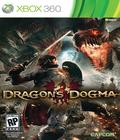Capcom has some of the biggest names in gaming under its belt, so it's easy to overlook the power of the Monster Hunter franchise. While it's never gained a foothold in the west, Monster Hunter is the game overseas. It's almost single-handedly responsible for the PSP continuing to be a force in the handheld market, and each new release is a big deal. So it's odd that Capcom almost seems to be competing with itself with Dragon's Dogma, which isn't a Monster Hunter clone, but it's not completely divergent, either. In any other situation, Dragon's Dogma would be a clever attempt by a competing company to take on Capcom's juggernaut. It's kind of an anomalous evolution of the franchise. As you'd expect, it's not flawless, but it is one of the better takes on a genre filled with knock-offs.
Dragon's Dogma takes places in a far-off fantasy world. You are a simple peasant in a fishing village, but your peaceful life is shattered when a dragon appears. It slaughters everyone, and you take up a blade to challenge it. The dragon is barely wounded by your attacks and quickly defeats you, tears out your still-beating heart and devours it. This should be the end, but for unknown reasons, your protagonist survives, the chest wound is magically scabbed over, and you returns to life as an Arisen with amazing powers. You set out to find and kill the dragon that tried to kill you.
The biggest problem with Dragon's Dogma is that it doesn't have an interesting setting. Aside from the sequence where the dragon rips out your heart, the game world is dull and lifeless with unmemorable characters and locations. This is exacerbated by the fact that your primary ally in the game is a Pawn, which is a strange soulless being from another dimension that seems to be like a living mannequin. As your pals and party members, Pawns are living dolls that lack any personality. This isn't helped by the bland protagonist, who mutely looks on as events occur.
What makes up for the dull world is the exciting combat and variety of monsters. One of the earliest sequences involves a gigantic hydra attacking a small fort, and you must find a way to slay the beast. There are a lot of different ways to approach combat. By default, you have three classes: Fighter, Strider and Wizard. Each has different strengths and weaknesses, but most importantly, each has a very different play style.
The Fighter, for example, is a traditional hack-and-slash fighter, but there's a lot more depth to him than you'd expect. Team members from Devil May Cry worked on Dragon's Dogma, and it shows. While you can slash wildly, it's a lot more effective to string together your moves into combos. You can do different combos by altering the tempo of your attacks, canceling moves, juggling enemies, and treating the game like a full-fledged action title instead of an action-RPG. You also have a lot of the traditional RPG standby moves, such as a taunt to draw aggro to yourself and various shield defenses to stagger enemies.
The Strider is the game's rogue. By default, you have a pair of daggers and a bow, but as you level up, you gain the ability to dodge, use wires to bind enemies, and other cool things. By far the standout ability is climbing large enemies like in Shadow of the Colossus. Every character can climb, but the Strider is built for it. Offensively, you can reach enemy weak points that are otherwise inaccessible. After all, scaling a giant ogre and stabbing it in the eye is more effective than chopping at its feet. You're also a lot safer when climbing an enemy because it has more limited ways to attack you. However, you can only climb as long as you have stamina, so if you unexpectedly run out, you'll fall off and take some damage. The Strider is a good climber because he has a lot more stamina than the other classes.
The Wizard is a traditional mage that casts spells, enchants weapons, heals, makes things explode, and unleashes elemental hell upon enemies. They're not boring to play, but they lack the interesting features of the other two classes. A wizard isn't going to climb many enemies or unleash complicated combos on their foes. It's just solid, dependable magic.
As you play, you'll find unlock advanced and hybrid versions of the above classes. You can become a Warrior instead of a Fighter, trading some of your combo ability for brute force, or a Mystic Knight, who can combine the elemental power of a Mage with the defensive abilities of a Fighter. There's a lot of variety, especially when you consider that you can go between classes and learn moves to create an even more varied character. It feels like you can do well no matter what you play. Each play style is different, and it's important to find one that fits you.
Oddly, Dragon's Dogma is not a multiplayer game. Almost everything about it says that it should be. It is structured like one and contains a number of design elements that would feel more at home in a multiplayer game than a single-player title. Instead, the roles of other players are filled by Pawns. For the purposes of gameplay, you get two kinds of Pawns: a "main" Pawn and recruitable Pawns. The main Pawn is a constant and customizable ally. You can alter its class, gender, height, weight and more. You'll usually want to make a Pawn that complements your character, such as a Warrior to defend your Mage.
The Pawn starts off rather stupid. It'll run into swarms of enemies and fail to understand basic tactics, but it progresses as you do. As you play, the Pawn learns based on triggers. If you hit an enemy with fire magic and it is weak, the Pawn will remember and hit the enemy with fire magic next time or remind you. It also adapts to your play style. I liked to hang back and snipe with my bow, and my Pawn gradually learned to attract enemies with special moves and to hold down fast foes so I could shoot them more easily. The AI is far from perfect, but after a certain point, it becomes quite clever. This is important, as your Pawn isn't just helping you.
Some recruitable Pawns are single-player NPCs, but the most interesting are Pawns that you can recruit from the Rift. These are other player's Pawns, and they come to you with all the knowledge gained from their own adventures with other players. If you recruit a Pawn that has done a quest you haven't, it'll give you all kinds of hints. It may run off to show you a secret stash of treasure or give advice about a boss' weak points based on how its player handled the situation. Train your Pawn well, and it will be more helpful to other players. In turn, those players rate it, so that your Pawn will more likely be hired by others. Your Pawn taking jobs gives it more experience — though not actual levels, as it doesn't get stronger without you. It gives them knowledge of enemies and events, and you'll earn rewards from those who your Pawn has helped.
The Pawn system is pretty cool, but it's no replacement for multiplayer. Dragon's Dogma's lack of multiplayer remains ever-present, and it is deeply unfortunate. The Pawns are an acceptable compromise between the lack of multiplayer and the game's multiplayer-focused features. By far the most annoying aspect of Pawns is that they never shut up. They constantly and endlessly chatter to let you know what they've learned and what they've remembered. You can alter this in options, but it is still an aggravating process. They're trying to help, but I'll remember "that wolf is weak to fire" after the 57th time I've set one alight.
What really make Dragon's Dogma stand out is the amazing physicality of the combat. In most video games, even at the best of times, your characters don't feel like they're connecting with their enemies. You swing a sword or shoot a gun, and there's a slight disconnect between the attack and its impact. In Dragon's Dogma, you can scale a giant chimera to stab its weak points or avoid being crushed by it, and that makes foes feel more real. The attacks have more weight behind them, so I don't just hit an enemy with a shield and watch him stagger back. I hit him with a shield, and he flies back, hits a tree and crumbles to the ground in a broken heap. If a particularly speedy enemy is darting around, I can hold him down so my Pawns can stab him. Most games only let you interact by stabbing or shooting the enemies, but Dragon's Dogma is one of the few that lets you treat them like physical objects instead of bags of hit points.
Alas, the combat is basically the highest point of Dragon's Dogma. The rest of the game is mostly there as an excuse to find new and scarier things to fight. The quests, much like the story, are workmanlike. You traverse the landscape, escorting boring NPCs or looking for a specific monster to kill. When you're in combat, it's completely engrossing, but when you're out of combat, it's not. There are rewards for exploring, but it lacks the sense of wonder of Skyrim or Fallout. It's more like Capcom's monster franchise, Monster Hunter, than any open-world RPG in that it's a coin toss whether it will be boring or exciting, depending on the enemies.
Dragon's Dogma has a tremendously inconsistent difficulty curve. You may breeze through some areas and fear for your life in others. It's excellent fun to wander off the beaten path and find yourself in a terrifying area full of powerful enemies that you have to sneak by. It's great to take down a powerful ogre or successfully ambush a bandit camp before they can get overwhelm you. On the other hand, it can be extremely frustrating to take a quest and discover that it's nearly impossible to finish. By the time you gain some levels to better prepare for the quest, it has expired and you're left frustrated. If there were a better sense of progression, it might not feel so ba. Unlike Dark Souls or similar difficult games, it can feel like your problem was levels instead of skill.
Dragon's Dogma is a surprisingly good-looking game marred by bland art direction. The graphics are fine, and there is some impressive scale thanks to the huge monsters and vast locations, but this is harmed by a generally unmemorable style. Much of the world I explored consisted of numerous vaguely indistinguishable forests or caves. The monsters look scary and are easily the best designed aspect of the game. If as much style had been put into the little things, Dragon's Dogma would be better at holding your attention. There were some cases of nasty slowdown during big sequences, but nothing was unreasonably detrimental to the experience. The voice acting is passable but not particularly good, and the constant chatter of the Pawns will drive anyone crazy after a while. The soundtrack, aside from the hilariously out of place rock theme song, is solid and contains a few memorable songs.
Dragon's Dogma is a fantastic combat system wrapped in a boring package. When it is on, it is one of the most intense, exciting and engrossing games I've ever played. When it is off, it can put you to sleep before you see a sign of a chimera or Cyclops. The character creation and combat development is involved enough to make me want to come back. It is a testament to the combat that it can hold one's attention through an endless swarm of escort missions, MMO-style item grinding and the blasé plot. The inconsistent difficulty is also a potential turnoff for many players. There's a lot to like in Dragon's Dogma if you're willing to look past the plain exterior.
Score: 7.5/10
More articles about Dragon's Dogma: Dark Arisen











 Set in a huge open world, Dragon's Dogma offers an exhilarating and fulfilling action combat game with the freedom to explore and interact in a rich, living and breathing world. Alongside your party of three, you set out to track down and destroy a mysterious dragon.
Set in a huge open world, Dragon's Dogma offers an exhilarating and fulfilling action combat game with the freedom to explore and interact in a rich, living and breathing world. Alongside your party of three, you set out to track down and destroy a mysterious dragon.







































